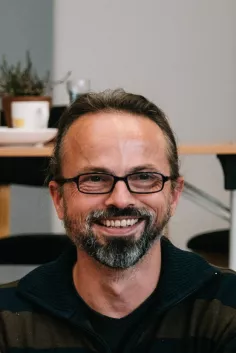Institute of Technology, Resource and Energy-efficient Engineering (TREE)
Double lecture by postdocs Dr. Bikash Sah and Dr. Alexander Hagg as part of the joint research colloquium series of the IWK department and the TREE Institute
Date
Thursday, 10 October 2024
Time
16:30 - 17:30
Location
Campus Sankt Augustin, Lecture hall 4

Dr. Bikash Sah: “Characterisation of Electrochemical Systems in Energy Networks”
Abstract: The recent development in energy generation to achieve carbon neutrality has led to the emergence of the use of different storage technologies. Electrochemical systems such as batteries, electrolysers, and fuel cells are capturing the market due to their flexibility to integrate with renewable energy sources like solar and wind. In addition, they are suitable for value-stacking different services that are required to ensure stability in the operation of energy networks. One of the critical challenges associated with the usage of electrochemical systems is degradation. The degradation can be defined as the reduction in the operational performance of electrochemical systems with usage and time eventually leading to the end of useful life. Proper haracterization of these electrochemical systems is essential and being performed at the start of life, during usage, and to conclude the end of useful life. This lecture will drive the audience to understand the relevance, methods, and research scope in haracterizati the electrochemical systems connected to energy networks.
Biography:
Bikash Sah received the B.Tech. degree in Electrical and Electronics Engineering from the National Institute of Technology Arunachal Pradesh, India, in 2014, and the Ph.D. degree from the Department of Electronics and Electrical Engineering, Indian Institute of Technology Guwahati, Guwahati, India, in 2022. In 2015, he started working as a Research Fellow in the Electric Mobility Lab, Indian Institute of Technology Guwahati where he was involved in the development of algorithms for vehicle-to-grid infrastructure, converters for chargers and powertrain, and charging techniques for reducing electrochemical degradation in Li-ion batteries. Since January 2022, he has been with Bonn Rhein-Sieg University of Applied Sciences in the R&D Group of Prof Dr. Marco Jung- Power Electronics and Power System Laboratory. His current research interests include converter design using wide bandgap devices, electric vehicles and their charging infrastructure, haracterization of electrochemical systems like batteries, electrolysers, and fuel cells.
Dr. Sah is a member of the IEEE USA and European Center for Power Electronics e.V (ECPE). He is also an active reviewer for many conferences and journals from IEEE, Elsevier, and Springer Nature.

Dr. Alexander Hagg: „AI-supported open source solutions for urban climate resilience“
Synopsis:
Climate change is having a major impact on cities, but local authorities often lack the expertise to adapt construction projects and construction planning to the change. Expertise has to be bought in and therefore cannot play a role in planning across the board. I am therefore developing a free, open source AI assistant, OpenSKIZZE, which creates climate-adapted building plans to reduce urban heat and thus also reduce CO2 emissions. Planning authorities, but also planning offices, can try out more with OpenSKIZZE, create optimized designs and understand the consequences of planning decisions.